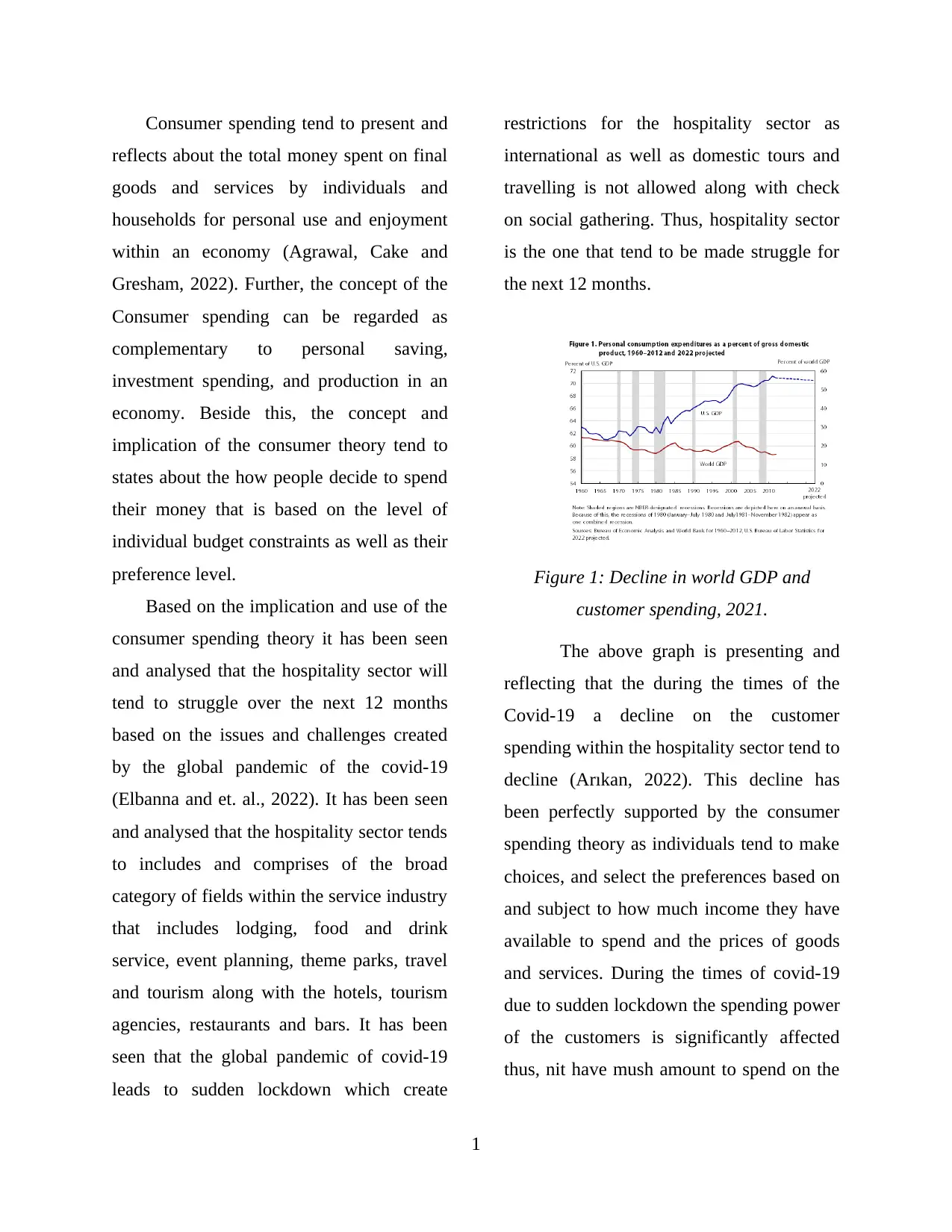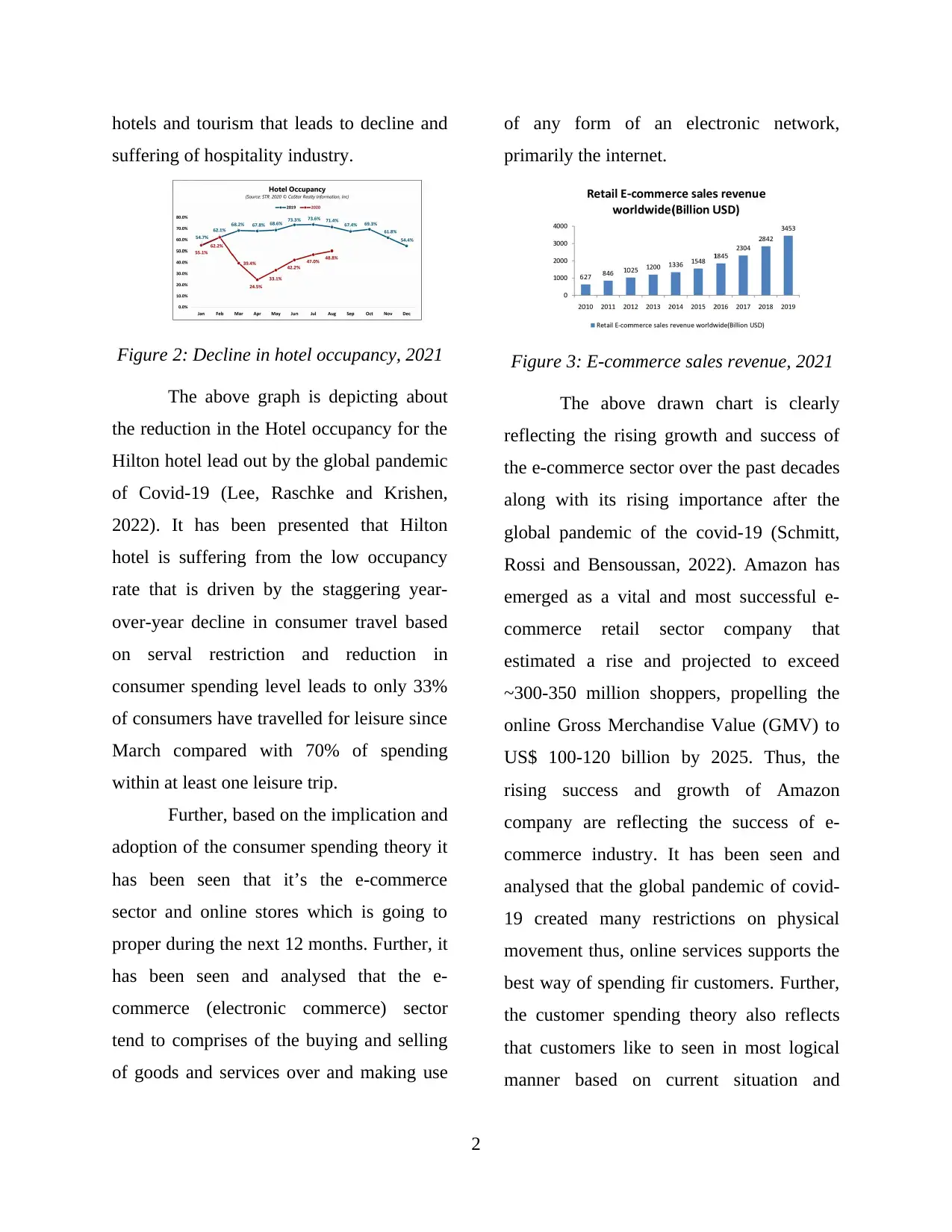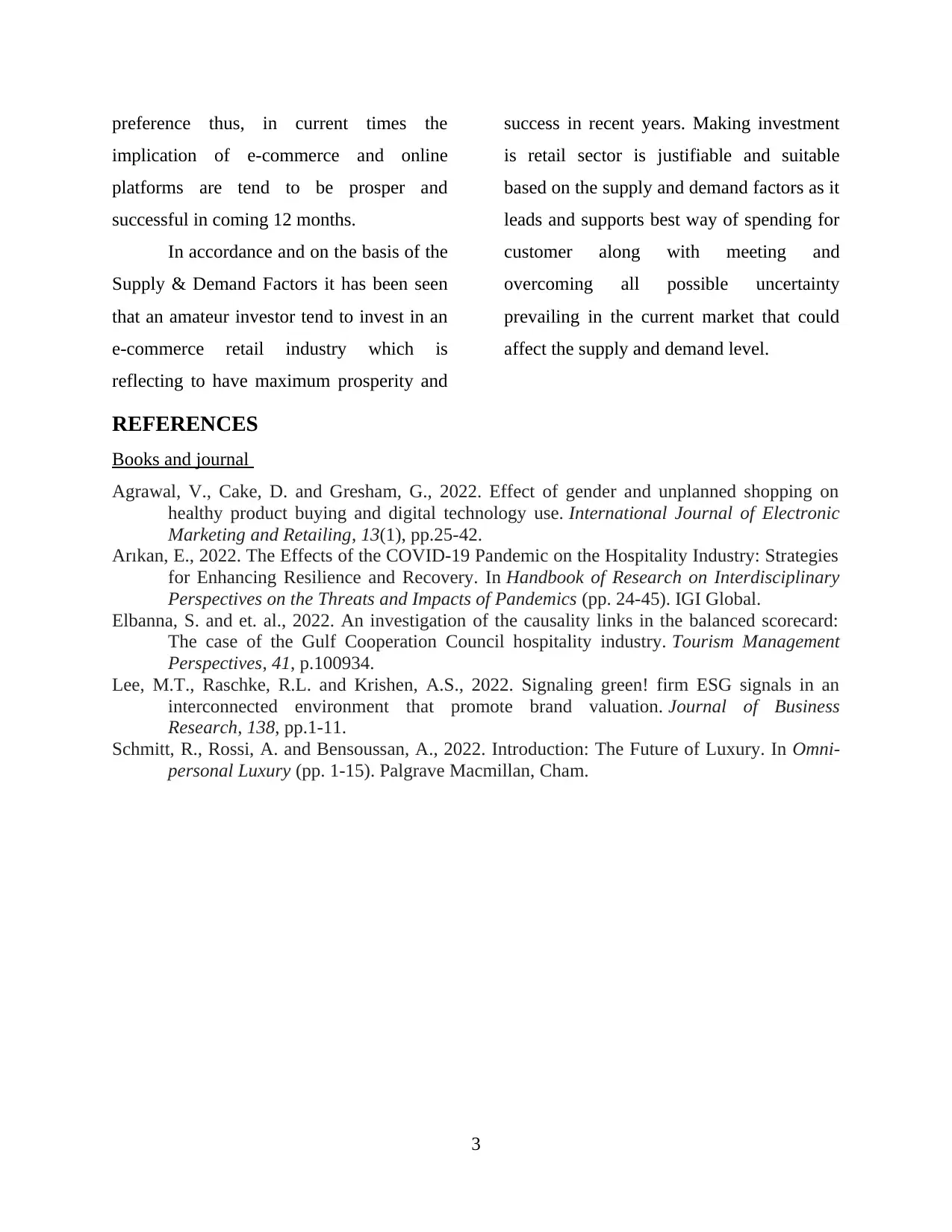BM461 Global Business Environment: Consumer Confidence and Investment
VerifiedAdded on 2023/06/14
|4
|1085
|265
Report
AI Summary
This report analyzes consumer spending trends and their implications for various sectors, particularly hospitality and e-commerce, in the context of the global pandemic. It leverages consumer spending theory to explain shifts in consumer behavior and the resulting impact on business sectors. The report highlights the struggles faced by the hospitality industry due to lockdowns and travel restrictions, evidenced by declines in world GDP and hotel occupancy. Conversely, it underscores the rise of the e-commerce sector, exemplified by Amazon's growth, as consumers shifted to online spending. The analysis concludes with investment suggestions for amateur investors, recommending the e-commerce retail industry due to its current prosperity and potential for future growth, driven by supply and demand factors. The report references academic sources to support its findings and recommendations.

Newspaper article
Paraphrase This Document
Need a fresh take? Get an instant paraphrase of this document with our AI Paraphraser

Consumer spending tend to present and
reflects about the total money spent on final
goods and services by individuals and
households for personal use and enjoyment
within an economy (Agrawal, Cake and
Gresham, 2022). Further, the concept of the
Consumer spending can be regarded as
complementary to personal saving,
investment spending, and production in an
economy. Beside this, the concept and
implication of the consumer theory tend to
states about the how people decide to spend
their money that is based on the level of
individual budget constraints as well as their
preference level.
Based on the implication and use of the
consumer spending theory it has been seen
and analysed that the hospitality sector will
tend to struggle over the next 12 months
based on the issues and challenges created
by the global pandemic of the covid-19
(Elbanna and et. al., 2022). It has been seen
and analysed that the hospitality sector tends
to includes and comprises of the broad
category of fields within the service industry
that includes lodging, food and drink
service, event planning, theme parks, travel
and tourism along with the hotels, tourism
agencies, restaurants and bars. It has been
seen that the global pandemic of covid-19
leads to sudden lockdown which create
restrictions for the hospitality sector as
international as well as domestic tours and
travelling is not allowed along with check
on social gathering. Thus, hospitality sector
is the one that tend to be made struggle for
the next 12 months.
Figure 1: Decline in world GDP and
customer spending, 2021.
The above graph is presenting and
reflecting that the during the times of the
Covid-19 a decline on the customer
spending within the hospitality sector tend to
decline (Arıkan, 2022). This decline has
been perfectly supported by the consumer
spending theory as individuals tend to make
choices, and select the preferences based on
and subject to how much income they have
available to spend and the prices of goods
and services. During the times of covid-19
due to sudden lockdown the spending power
of the customers is significantly affected
thus, nit have mush amount to spend on the
1
reflects about the total money spent on final
goods and services by individuals and
households for personal use and enjoyment
within an economy (Agrawal, Cake and
Gresham, 2022). Further, the concept of the
Consumer spending can be regarded as
complementary to personal saving,
investment spending, and production in an
economy. Beside this, the concept and
implication of the consumer theory tend to
states about the how people decide to spend
their money that is based on the level of
individual budget constraints as well as their
preference level.
Based on the implication and use of the
consumer spending theory it has been seen
and analysed that the hospitality sector will
tend to struggle over the next 12 months
based on the issues and challenges created
by the global pandemic of the covid-19
(Elbanna and et. al., 2022). It has been seen
and analysed that the hospitality sector tends
to includes and comprises of the broad
category of fields within the service industry
that includes lodging, food and drink
service, event planning, theme parks, travel
and tourism along with the hotels, tourism
agencies, restaurants and bars. It has been
seen that the global pandemic of covid-19
leads to sudden lockdown which create
restrictions for the hospitality sector as
international as well as domestic tours and
travelling is not allowed along with check
on social gathering. Thus, hospitality sector
is the one that tend to be made struggle for
the next 12 months.
Figure 1: Decline in world GDP and
customer spending, 2021.
The above graph is presenting and
reflecting that the during the times of the
Covid-19 a decline on the customer
spending within the hospitality sector tend to
decline (Arıkan, 2022). This decline has
been perfectly supported by the consumer
spending theory as individuals tend to make
choices, and select the preferences based on
and subject to how much income they have
available to spend and the prices of goods
and services. During the times of covid-19
due to sudden lockdown the spending power
of the customers is significantly affected
thus, nit have mush amount to spend on the
1

hotels and tourism that leads to decline and
suffering of hospitality industry.
Figure 2: Decline in hotel occupancy, 2021
The above graph is depicting about
the reduction in the Hotel occupancy for the
Hilton hotel lead out by the global pandemic
of Covid-19 (Lee, Raschke and Krishen,
2022). It has been presented that Hilton
hotel is suffering from the low occupancy
rate that is driven by the staggering year-
over-year decline in consumer travel based
on serval restriction and reduction in
consumer spending level leads to only 33%
of consumers have travelled for leisure since
March compared with 70% of spending
within at least one leisure trip.
Further, based on the implication and
adoption of the consumer spending theory it
has been seen that it’s the e-commerce
sector and online stores which is going to
proper during the next 12 months. Further, it
has been seen and analysed that the e-
commerce (electronic commerce) sector
tend to comprises of the buying and selling
of goods and services over and making use
of any form of an electronic network,
primarily the internet.
Figure 3: E-commerce sales revenue, 2021
The above drawn chart is clearly
reflecting the rising growth and success of
the e-commerce sector over the past decades
along with its rising importance after the
global pandemic of the covid-19 (Schmitt,
Rossi and Bensoussan, 2022). Amazon has
emerged as a vital and most successful e-
commerce retail sector company that
estimated a rise and projected to exceed
~300-350 million shoppers, propelling the
online Gross Merchandise Value (GMV) to
US$ 100-120 billion by 2025. Thus, the
rising success and growth of Amazon
company are reflecting the success of e-
commerce industry. It has been seen and
analysed that the global pandemic of covid-
19 created many restrictions on physical
movement thus, online services supports the
best way of spending fir customers. Further,
the customer spending theory also reflects
that customers like to seen in most logical
manner based on current situation and
2
suffering of hospitality industry.
Figure 2: Decline in hotel occupancy, 2021
The above graph is depicting about
the reduction in the Hotel occupancy for the
Hilton hotel lead out by the global pandemic
of Covid-19 (Lee, Raschke and Krishen,
2022). It has been presented that Hilton
hotel is suffering from the low occupancy
rate that is driven by the staggering year-
over-year decline in consumer travel based
on serval restriction and reduction in
consumer spending level leads to only 33%
of consumers have travelled for leisure since
March compared with 70% of spending
within at least one leisure trip.
Further, based on the implication and
adoption of the consumer spending theory it
has been seen that it’s the e-commerce
sector and online stores which is going to
proper during the next 12 months. Further, it
has been seen and analysed that the e-
commerce (electronic commerce) sector
tend to comprises of the buying and selling
of goods and services over and making use
of any form of an electronic network,
primarily the internet.
Figure 3: E-commerce sales revenue, 2021
The above drawn chart is clearly
reflecting the rising growth and success of
the e-commerce sector over the past decades
along with its rising importance after the
global pandemic of the covid-19 (Schmitt,
Rossi and Bensoussan, 2022). Amazon has
emerged as a vital and most successful e-
commerce retail sector company that
estimated a rise and projected to exceed
~300-350 million shoppers, propelling the
online Gross Merchandise Value (GMV) to
US$ 100-120 billion by 2025. Thus, the
rising success and growth of Amazon
company are reflecting the success of e-
commerce industry. It has been seen and
analysed that the global pandemic of covid-
19 created many restrictions on physical
movement thus, online services supports the
best way of spending fir customers. Further,
the customer spending theory also reflects
that customers like to seen in most logical
manner based on current situation and
2
⊘ This is a preview!⊘
Do you want full access?
Subscribe today to unlock all pages.

Trusted by 1+ million students worldwide

preference thus, in current times the
implication of e-commerce and online
platforms are tend to be prosper and
successful in coming 12 months.
In accordance and on the basis of the
Supply & Demand Factors it has been seen
that an amateur investor tend to invest in an
e-commerce retail industry which is
reflecting to have maximum prosperity and
success in recent years. Making investment
is retail sector is justifiable and suitable
based on the supply and demand factors as it
leads and supports best way of spending for
customer along with meeting and
overcoming all possible uncertainty
prevailing in the current market that could
affect the supply and demand level.
REFERENCES
Books and journal
Agrawal, V., Cake, D. and Gresham, G., 2022. Effect of gender and unplanned shopping on
healthy product buying and digital technology use. International Journal of Electronic
Marketing and Retailing, 13(1), pp.25-42.
Arıkan, E., 2022. The Effects of the COVID-19 Pandemic on the Hospitality Industry: Strategies
for Enhancing Resilience and Recovery. In Handbook of Research on Interdisciplinary
Perspectives on the Threats and Impacts of Pandemics (pp. 24-45). IGI Global.
Elbanna, S. and et. al., 2022. An investigation of the causality links in the balanced scorecard:
The case of the Gulf Cooperation Council hospitality industry. Tourism Management
Perspectives, 41, p.100934.
Lee, M.T., Raschke, R.L. and Krishen, A.S., 2022. Signaling green! firm ESG signals in an
interconnected environment that promote brand valuation. Journal of Business
Research, 138, pp.1-11.
Schmitt, R., Rossi, A. and Bensoussan, A., 2022. Introduction: The Future of Luxury. In Omni-
personal Luxury (pp. 1-15). Palgrave Macmillan, Cham.
3
implication of e-commerce and online
platforms are tend to be prosper and
successful in coming 12 months.
In accordance and on the basis of the
Supply & Demand Factors it has been seen
that an amateur investor tend to invest in an
e-commerce retail industry which is
reflecting to have maximum prosperity and
success in recent years. Making investment
is retail sector is justifiable and suitable
based on the supply and demand factors as it
leads and supports best way of spending for
customer along with meeting and
overcoming all possible uncertainty
prevailing in the current market that could
affect the supply and demand level.
REFERENCES
Books and journal
Agrawal, V., Cake, D. and Gresham, G., 2022. Effect of gender and unplanned shopping on
healthy product buying and digital technology use. International Journal of Electronic
Marketing and Retailing, 13(1), pp.25-42.
Arıkan, E., 2022. The Effects of the COVID-19 Pandemic on the Hospitality Industry: Strategies
for Enhancing Resilience and Recovery. In Handbook of Research on Interdisciplinary
Perspectives on the Threats and Impacts of Pandemics (pp. 24-45). IGI Global.
Elbanna, S. and et. al., 2022. An investigation of the causality links in the balanced scorecard:
The case of the Gulf Cooperation Council hospitality industry. Tourism Management
Perspectives, 41, p.100934.
Lee, M.T., Raschke, R.L. and Krishen, A.S., 2022. Signaling green! firm ESG signals in an
interconnected environment that promote brand valuation. Journal of Business
Research, 138, pp.1-11.
Schmitt, R., Rossi, A. and Bensoussan, A., 2022. Introduction: The Future of Luxury. In Omni-
personal Luxury (pp. 1-15). Palgrave Macmillan, Cham.
3
1 out of 4
Related Documents
Your All-in-One AI-Powered Toolkit for Academic Success.
+13062052269
info@desklib.com
Available 24*7 on WhatsApp / Email
![[object Object]](/_next/static/media/star-bottom.7253800d.svg)
Unlock your academic potential
Copyright © 2020–2026 A2Z Services. All Rights Reserved. Developed and managed by ZUCOL.




